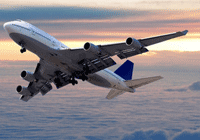
Global air passenger traffic up 8.6pc
Geneva, April 3, 2012
Global air traffic showed an 8.6 per cent improvement in passenger demand and a 5.2 per cent rise in cargo demand in February this year compared to the same month in the previous year, International Air Transport Association (Iata) said.
Several factors inflated February 2012 results and distorted comparisons with the year-ago period. These included weaker traffic during the Arab Spring a year ago and the occurrence of Carnival in Brazil in February, a month earlier than in 2011.
Middle East carriers posted 23.4 per cent international growth which is distorted by the poor performance in February 2011 owing to the impact of the Arab Spring. Capacity growth stood at 16.1 per cent. Average load factors for the region showed the most dramatic improvement to 76.9 per cent in February 2012 compared to 72.4 per cent in the previous year.
Stripping out the distortions, Iata estimates that the region has now fully recovered.
Cargo demand was also subject to positive distortion by the occurrence of Chinese New Year in January which pushed some deliveries into February. When comparing to January 2012 levels, the picture becomes much more moderate, with passenger demand growing by 0.4 per cent and cargo demand declining by 1.2 per cent.
Global passenger capacity expanded by 7.4 per cent compared to previous-year levels, lagging behind the 8.6 per cent increase in demand. This has had a positive impact on load factors, which airlines have maintained at 75.3 per cent - better than the 74.4 per cent recorded in February 2011.
Freight demand continued to be relatively stable. This trend started to develop in September 2011 and is consistent with improvements in business confidence.
“The outlook is fragile. Improvements in business confidence slowed in February. This will limit the potential for business class travel growth and it implies that an uptick for cargo is not imminent. At the same time, airlines trying to recoup rising fuel costs could risk reduced volumes on price sensitive market segments. Weak economic conditions and rising fuel costs are a double-whammy that an industry anticipating a 0.5 per cent margin can ill-afford,” said Tony Tyler, Iata’s director general and CEO.
Cargo growth was led by Middle East carriers with an 18.2 per cent increase in demand which was matched exactly with an 18.2 per cent increase in capacity. The largest volume contributor to February’s growth, however, was the Asia-Pacific region which posted a 10.2 per cent year-on-year gain.
“We are ending the first quarter with a considerable amount of uncertainty. While the threat of a European financial meltdown seems more remote than it did only a few months ago, the political risks that aviation faces are growing. The rapid increase in the price of oil is already biting hard. The UK is increasing the onerous Air Passenger Duty. Europe is adding to the burden with the inclusion of international aviation in its emissions trading scheme—the extra-territorial aspects of which are creating the possibility of a trade war that nobody can afford.
'The exact conditions vary from country to country, but around the world we see ill-conceived policy initiatives that over-regulate, excessively tax or otherwise restrain the aviation industry. This prevents it from being the catalyst for economic growth that it can be,” said Tyler.
The latest study by Oxford Economics on the global benefits of aviation calculates that the industry supports 56.6 million jobs and enables $2.2 trillion of economic activity. With 35 per cent of the value of goods traded internationally travelling by air, the connectivity provided by air transport is one of the key enablers of global business, Iata said. - TradeArabia News Service







